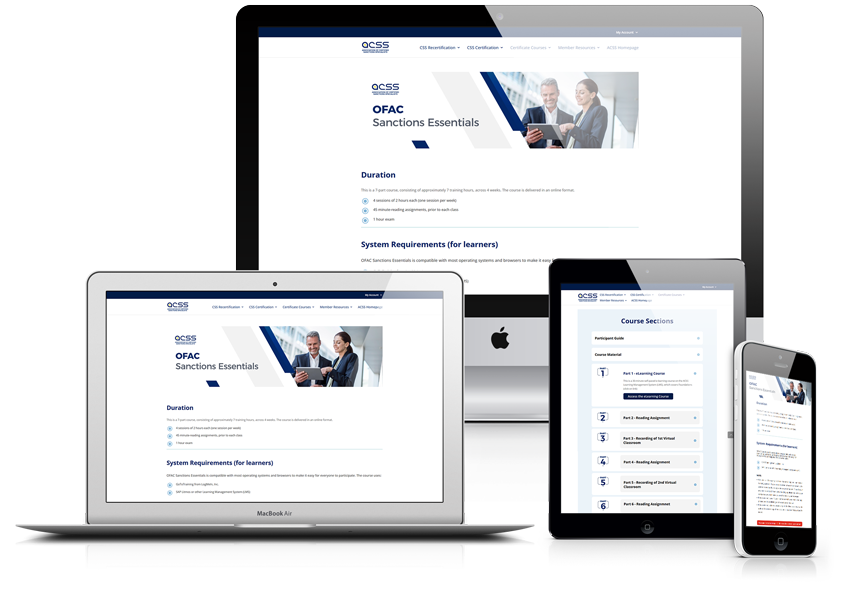OFAC REGULATIONS MASTERCLASS
TRAINING COURSE
Intermediate and Advanced Level
Identify Transactions Liable to OFAC Sanctions
Master US Compliance:
Step-by-Step Method
Anticipate OFAC Compliance Problems Post-Screening –
5 Classes that Build Your Knowledge for Identifying Risk
Training hours: 16
Valid for CSS Accreditation
Level: Advanced
You’ll start with a review
The course begins with a two-hour class reviewing the fundamentals of OFAC administration. You willl move on to discuss the relationships between sources of law and information and examine the blocking prohibition.
You’ll get a thorough grounding
You will immerse yourself in the non-blocking IEEPA-based embargo programs, examine the most popular general licenses and exemptions across multiple embargo programs, dissect country-focused programs weighted toward the financial sector, and discuss methods for dealing with ambiguity.
You’ll be right up to date
You will take a class on OFAC sanctions programs specific to Russia and conclude with provisions targeting conduct with no US nexus and non-sanctioned territories controlled by sanctioned entities. Case studies and breakout sessions will help you understand OFAC compliance fully before your one-hour, multiple-choice exam and written answer to a case study. You will get personal feedback.
Only part of what you will know
by the end of the course…
- The relationships between regulations and statutes and auxiliary sources of information and authority, such as guidance and FAQs.
- The scope and application of the blocking prohibition.
- The determination of whether a non-blocked person is subject to an applicable prohibition.
- The application of the cross-programmatic prohibitions on the “import” and “export” of “services” and “goods”; the “new investment” prohibition.
- Issues involving the operation and maintenance of accounts for sanctioned individuals.
- The most popular general licenses and exemptions that apply.
- The irregular “new investment” prohibition, including dealings in Russia-related securities.
How it is structured?

Virtual Classroom lead by a live instructor: Fundamentals & Basic Blocking Prohibition (2 hours)

Virtual Classroom lead by a live instructor: Territory-based Embargo Programs: Common General Licenses and Exemptions (2 hours)

Virtual Classroom lead by a live instructor: Irregular Non-embargo Primary Sanctions Programs and Methodologies for Addressing Questions Involving OFAC’s “Gray Areas” (2 hours)

Virtual Classroom lead by a live instructor: Russia-specific Non-blocking Sanctions Imposed in Connection with the February 2022 Invasion of and War in Ukraine (2 hours)

Virtual Classroom lead by a live instructor: OFAC Risk Management and Other categories of sanctions. (2 hours)

Final assessment (60 minutes)
ACSS Virtual Learning

LAPTOP, TABLET OR SMARTPHONE
Who Should Take the OFAC Masterclass Training Course?
THE TYPICAL student is a sanctions professional with targeted OFAC advisory duties in industry and finance. His or her objective will be to build on knowledge post-screening to take a proactive stance on sanctions issues. You don’t have to be an attorney or accountant. Our students come from diverse backgrounds, all sharing the same goal: to master OFAC compliance. Your OFAC expertise will make a difference in your company, whether big or small. Your background is not as important as your need to learn information to keep on the right side of the law. We’re here to help you.
Advanced, Recognized OFAC Sanctions Course at the Best Price
Upcoming Course Schedule
2026 Winter Session
- Date Course Goes Live: January 14, 2026
- 1st Virtual Classroom: January 21, 2026 – 09:00 AM – 11:00 AM (NYC)
- 2nd Virtual Classroom: January 28, 2026 – 09:00 AM – 11:00 AM (NYC)
- 3rd Virtual Classroom: February 04, 2026 – 09:00 AM – 11:00 AM (NYC)
- 4th Virtual Classroom: February 11, 2026 – 09:00 AM – 11:00 AM (NYC)
- 5th Virtual Classroom: February 18, 2026 – 09:00 AM – 11:00 AM (NYC)
ACSS
Members
Non-ACSS
Members
For more information
SCHEDULE A MEETING
with one of our associatesEMAIL US AT:
acss@sanctionsassociation.orgInstruction from TOP Practitioners

Brian Gatta
Prior to his work at Sanctions Inc., Brian spent over a decade as an attorney practicing in the international trade groups of large law firms. Brian graduated with honors from Columbia Law School in 2007.
